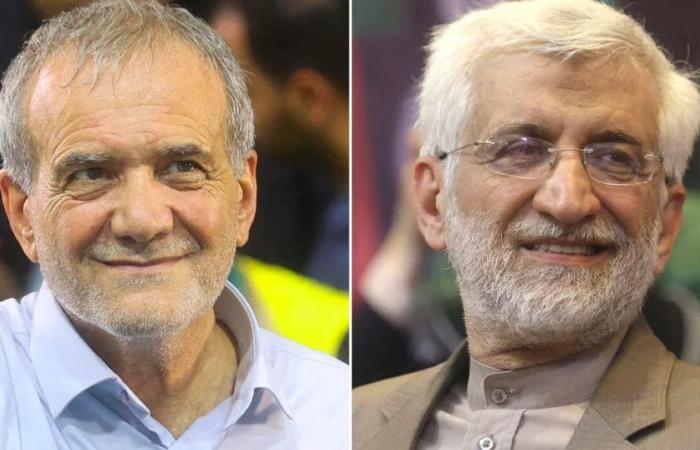
The reformer Masoud Pezeshkian and the ultraconservative Saeed Jalili will compete for the Iranian presidency in a second round of elections after neither candidate managed to secure 50% of the votes in the first round, the country’s Electoral Commission reported on Saturday.
These presidential elections recorded the lowest turnout in the history of the Islamic Republic of Iranwith only 40% of voters who went to the polls, a fact that shows the citizen discontent due to the economic situation and the lack of freedoms.
“None of the candidates has obtained an absolute majority of the votes“said the spokesman for the Electoral Commission, Mohsen Eslamiin a televised press conference.
“A second round will be held as established by law, which will be on July 5“added Eslami, who announced that 24,535,185 people voted, which represents 40% of the electorate.
In the elections The reformist Pezeshkian has won with 10,415,991 votes, representing 42.4% of the total.closely followed by Jalili with 9,473,298 votes or 38.6%.
Far from being the favorite when the electoral campaign began, the pragmatic conservative Mohammad Baqer Qalibafwith 3,383,340 votes, 13.79%, and beyond that the fourth candidate is the cleric Mostafa Pourmohammadi with 206,397 ballots, 0.8%.
Elections are held to choose the president’s successor Ebrahim Raisiwho died in a helicopter crash in May, along with seven other people.
The Iranian president has decision-making power on national issues and to a lesser extent on foreign and security policy in Iran, where Ali Khamenei He acts as head of state with vast powers.
The cardiac surgeon Masoud PezeshkianThe 69-year-old former health minister began the campaign with low expectations but has gained ground throughout the campaign with a message of rapprochement with the West and criticism of the veil.
Their electoral slogan is “For Iran”, which evokes the title of the song that became the anthem of the protests unleashed by the death of Mahsa Amini and whose author Shervin Hajipour was sentenced to almost four years for it.
He has received the support of former presidents Mohamed Khatami (1997-2005) and Hasan Rohaní (2013-2021) of the reformist bloc – which seeks a certain opening of the country – after the participation of a moderate was not allowed in the 2021 presidential elections. , and belongs to the Azeri minority.
Pezeshkian has in fact presented his hypothetical government as a “third term” for Khatami, the first reformist president who breathed a certain air of openness into Iran, and with whom he entered politics in 2000 as Minister of Health.
At the opposite pole is Jalilia 58-year-old former chief Iranian nuclear negotiator who has been described as a “true product of the Islamic Revolution,” has served as an adviser to Iran’s supreme leader, Ali Khamenei, and is opposed to the West.
Jalili is considered the candidate of the status quo and who will follow the policies of the ultra-conservative Raisí, under whose government repression increased.
The elections have recorded the lowest turnout in the history of the Islamic Republicwhich places great importance on participation in elections as a sign of its legitimacy and popular support.
So, The percentage of votes is below the previous presidential elections of 2021which registered 48%, and the parliamentarians of March when 41% voted.
This low participation shows the level of popular discontent due to the poor economic situation, the lack of freedoms and a deep detachment from the Islamic Republic, especially among young people.
Khamenei’s repeated calls to vote “for the continuation, strength, dignity and honour of the Islamic Republic” appear to have fallen on deaf ears.
While the authorities see voting as a sign of support, many Iranians believe that abstention is a form of protest and a way of undermining the legitimacy of the Islamic system.
(EFE)

